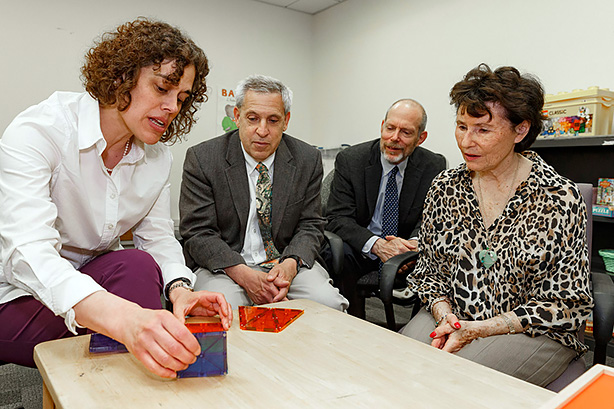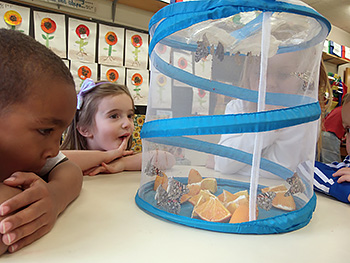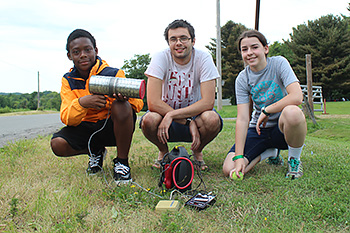
Professor Marianella Casasola explains spatial learning concepts to Evalyn Edwards Milman '60, right, during a tour of the Cornell Infant Studies Laboratory as Dean Alan Mathios and BCTR Director Karl Pillemer look on. Photo: Dave Burbank.
Bronfenbrenner Center gifts support the greater good
Growing up on a dairy farm in rural Vermont, Rebecca Q. Morgan '60 was drawn to 4-H. At cattle shows and fashion displays and as president of her local club, Morgan says eight years in 4-H taught her everything from public speaking and accounting to leadership and dressmaking.

Preschoolers examine butterflies at the Madison County Head Start, a new partner for Casasola's research thanks to her work as a BCTR Faculty Fellow. Photo: Madison County Head Start/provided.
"It was a wonderful outlet for me to develop a great deal of practical skills and gain confidence in my abilities," says Morgan, who went on to become a California state senator, where she stood out as an advocate for child development and education.
With a $1.2 million gift to Cornell's Bronfenbrenner Center for Translational Research (BCTR), Morgan is giving back to improve 4-H and community-based youth education programs from the ground up. Her gift, made in late 2015, provides three years of startup funding for the Program for Research on Youth Development and Engagement (PRYDE), an initiative launched this spring by Cornell social scientists to foster groundbreaking research in partnership with New York State 4-H and its 200,000 children and teen participants in four areas: life purpose, healthy transitions into adolescence, intergenerational connections and productive social media use. In close collaboration with 4-H staff and youth, PRYDE seeks to integrate evidence into new and existing programs while also sparking young people's interest in social science.
The BCTR, based in the College of Human Ecology, received another boost during the Cornell Now campaign thanks to a $1.6 million gift from Evalyn Edwards Milman '60 and Stephen Milman '58, MBA '59. The couple endowed the Evalyn Edwards Milman '60 BCTR Faculty Fellowship, part of a new program to embed professors in the BCTR and link their research directly to community needs.
Totaling nearly $3 million, the gifts represent an unprecedented level of alumni support for the center, which formed in 2011 to bridge the gap between social science research and practice.
"One of our major goals as a center is to encourage more faculty members to conduct translational research, inspiring them to consider how their work applies to real-world problems and can serve people throughout the life span," says BCTR Director Karl Pillemer, the Hazel E. Reed Professor in the Department of Human Development. "Both of these gifts provide new avenues for faculty to take cutting-edge scientific research and move it into real-world settings."

At Camp Bristol Hills in Canandaigua, N.Y., 4-H teens collaborate on a STEM project. PRYDE enables Cornell researchers to partner with community educators to work on improving 4-H and other out-of-school education programs. Photo: 4-H/provided.
In New York, Cornell oversees 4-H through the BCTR and Cornell Cooperative Extension, offering the ideal environment for PRYDE to test interventions through a community-based participatory research model developed and refined by BCTR researchers. Campus-county teams will identify research needs, design studies and interpret and disseminate data through a statewide "research ready" network.
"I am most excited that PRYDE is taking science and putting it into service to help young people," says Morgan, president of the Morgan Family Foundation, a philanthropic organization dedicated to youth, education and the environment. "4-H offers a ready-made network for translating Cornell research into effective youth programs. The program is positioned to become a national leader on this topic."
PRYDE will also host campus visits and provide opportunities for 4-H members to observe social science research firsthand. Furthermore, it is forming a group of undergraduate PRYDE Scholars, launching this summer, to enable Cornell students to work with faculty mentors and train in translational research methods.
As the first Milman BCTR Faculty Fellow, Marianella Casasola, associate professor of human development, is also extending her child-development research into community-based settings. Her Cornell Infant Study Laboratory works closely with Madison County, New York, Head Start, testing Casasola's previous research on how preschool children acquire spatial skills and language in a new school environment.
"I am excited that Professor Casasola has chosen to work with Head Start, for this was a vision of Professor Urie Bronfenbrenner," says Evalyn Milman, who studied under Bronfenbrenner, a child psychologist and BCTR namesake. "His purpose was to establish a comprehensive program in early childhood education -- working with children from low-income families -- designed to establish an environment for the development of cognitive skills. This research into constructive play by young children, and exploration of how spatial and language skills develop, will bring results that will have lasting impact in the field of education."
Joined by Rebecca Seguin, assistant professor of nutritional sciences, and Christopher Wildeman, associate professor of policy analysis and management, in the inaugural group of BCTR Faculty Fellows, the scholars receive funding for a graduate research assistant, pilot studies and translational research pursuits.
"With our focus on public engagement, not only do gifts to the BCTR support Cornell, but they serve the greater good due to our work helping a wide range of populations, such as struggling adolescents, children in foster care, families in the military or older adults," Pillemer says. "It will help to generate new knowledge for the benefit of communities and to allow faculty and students to marry science and service, which was a hallmark of Urie Bronfenbrenner's work."